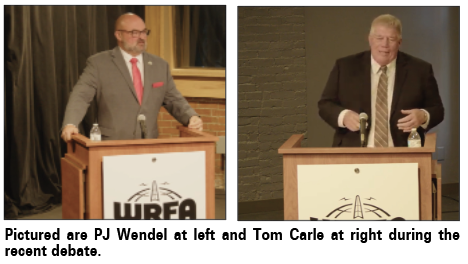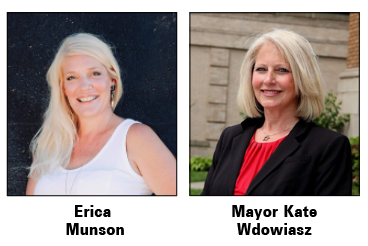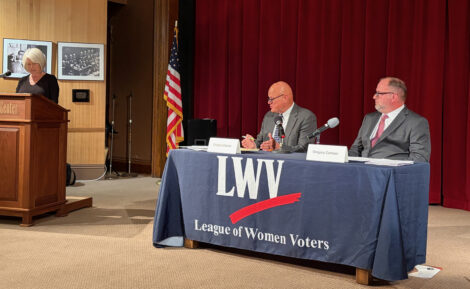Population, lake weeds, homeless debated by exec candidates

For about 60 minutes the two candidates running for the top position in Chautauqua County squared off, debating topics including budgets, pay, and the health of Chautauqua Lake.
The Post-Journal/OBSERVER, WRFA, and WJTN co-hosted a debate between Republican incumbent PJ Wendel and challenger Tom Carle for the position of county executive.
Wendel, a Lakewood resident, has been in the position of county executive since January 2020. Before that, he was the chairman of the county legislature and has a background in education.
Carle of Fredonia has been a member of the county legislature since December after former legislator Susan Parker stepped down. He has a business background, working in many different fields, including a commercial bakery in Ohio that had 2,500 employees and a $175 million budget.
The debate was held in WRFA’s studio in Jamestown. It was moderated by WRFA Public Affairs Director Julia Ciesla-Hanley, with OBSERVER/Post-Journal Editor John D’Agostino and WJTN News Director Terry Frank in attendance, asking questions.
To open the debate, Wendel highlighted his experience.
“Under my leadership we’ve focused on building a stronger, safer and more prosperous community. We’ve strengthened our economy by supporting small businesses, attracting new investment and revitalizing our industrial base,” he said.
Carle, meanwhile, noted how in his businesses employment, he has helped cut costs, improved efficiencies, improved safety, saved jobs, and improved the quality of their product.
“I believe in Chautauqua County I can do a similar job in turning things around, stopping the decline of our county with the losses of residents, losses of employers, loss of jobs, and resolving some of the age-old issues that continue to persist,” he said.
POPULATION LOSS
The two candidates were asked about their plans to address Chautauqua County’s population loss, which has continued a downward slide since the 1970s.
Wendel noted how the county recently launched Live CHQ and Choose CHQ – a program designed to attract new people and businesses to the county.
“We’re actually out there doing the job and getting people back. This is a talented and attractive place,” he said.
Carle, meanwhile insists a strategy is needed, which includes lowering taxes, cutting costs and being business friendly.
“I will be a liaison with the manufacturing community. I’ll work with all of the small businesses. …. I have the experience, I know what people need and I think the county can lead that whole effort,” he said.
REDUCE SPENDING/STAFFING LEVELS
Carle noted that when the County Home closed in 2014, there were 200 jobs that were eliminated. Since then, the county’s job total has gone back and is even higher today.
“That’s overhead for the county. I’m not sure what everybody’s doing but it’s counter intuitive to gain employees in the government when you’ve lost 14,000 people in the last 20 years,” he said.
Wendel responded about the increased number of jobs, saying most are “grant funded, revenue generated, or mandated by the state of New York.”
Wendel did acknowledge that during his tenure the county has expanded the fly car program, which assists volunteer firefighters with paid emergency medical technicians, as well as hire school resource officers.
“I’m sorry, I’m not going to jeopardize the safety of our residents or the safety of our children because we don’t want to hire more individuals,” he said.
The county is responsible for the paid EMT staff, while school districts generally pay for school resource officers.
Carle responded that some county employees are being paid large amounts, higher than the private sector would pay.
“I’ve actually found some people who were making exorbitant salaries for the tasks they were doing,” he said.
Carle said he found out there is a county employee whose salary went up about $100,000 over three years, however he did not name the person, job title or department.
Wendel appeared skeptical of Carle’s assertion.
“I’d really like to find out who made over $100,000 in three years. That’s interesting to me,” he replied.
Later in the debate, Carle seemed to criticize the pay increases to three county unions, all connected to the Sheriff’s Office.
“Recently we just approved the contract with 4% raises for four years for that particular group. … How do you explain those things,” he said. Carle later added, “If you go by the per capita income and per capita raises of the taxpayers of Chautauqua County, I don’t think many of them get 4% every year for four years. I don’t think any of them are getting the raises like the one example I brought up.”
Wendel defended the raises, arguing the Sheriff Department union members were underpaid and deserve the higher wages.
“These are our sheriff’s deputies, our road patrol. Unfortunately, they had to take the life of an individual. This weighs heavily on them. But at a moment’s notice, that’s what they’re thrust into. It’s not a dollar figure,” he said.
CHAUTAUQUA LAKE HEALTH
The candidates were asked about the weed problem in Chautauqua Lake, the harmful algal blooms, and the new state wetland regulations.
Wendel responded, saying he wasn’t sure 60 minutes would be enough time to share everything they’ve done and are currently working on.
He noted the Watershed Management Alliance recently voted to restructure. The new group will have representatives from five towns, four villages, and two members from each of the stakeholder groups.
Wendel continued, noting they’re working with the U.S. Army Corps of Engineers, something that took 10 years to implement.
Carle responded that there’s too much studying the problem with outsiders and not enough effort at fixing it.
“We’ve done study, to studies, to studying the studies, and it’s about time someone got in there who actually was a root cause analysis expert, got in with the right people and we turn that lake around,” he said.
ASSISTING LOCAL MUNICIPALITIES
The candidates were asked about the county assisting municipalities who are facing or have recently implemented large tax hikes.
Carle noted how the Democratic legislators tried to have a discussion to give more sales tax money to local municipalities. The Republican majority overrode their proposal.
Dunkirk, in particular, had its property taxes increase by more than 80% last year and is looking at a 2% increase again this year. Carle said perhaps the county could buy Dunkirk’s water plant to “bail them out.”
He admits that idea is not supported by Dunkirk Mayor Kate Wdowiasz, who is a fellow Democrat, but Carle said that doesn’t matter to him.
“I’m not going to be a status-quo county executive. I’ll be someone who puts bold ideas out there,” he said.
Wendel, meanwhile, said he has money in the budget to help consolidations. He specifically noted that he has helped coordinate conversations with Dunkirk and Fredonia for a joint police station.
At the same time, Wendel questioned if it’s the responsibility of the county to bail out a municipality that has been poorly managed.
“We’re looking at the city of Dunkirk. We don’t even know what their current debt ratio is. We think it’s between $15-18 million. Yet they took out a $12 million revenue anticipation loan,” he said.
Carle agreed about Dunkirk.
“You can’t pour good money down following bad money, when they’re struggling,” he said.
HOMELESS CRISIS
The candidates were asked about the growing need for emergency housing and social services.
Wendel responded that he has formed a team to address the homeless issue in the county.
He admits that sometimes when the county uses hotels, nearby residents protest having homeless housed in their neighborhoods, so his department heads are “using creative new ideas” to address the issue.
He also argued that money alone will not fix the problem.
“The most important thing we’re focusing on now is a self-contained unit where you can stay but also get on-the-job training and counseling sessions,” Wendel said.
Carle noted how a couple of months ago he spoke at a county legislature meeting expressing his concerns of a hotel in Fredonia that both housed homeless people as well as was being rented out by travelers.
Carle complimented Wendel for addressing the topic, but complained that it should have been addressed sooner.
“Why do things take so long? Whether it’s the lake, whether it’s the homeless situation, whether it’s getting drug addiction programs in, whether it’s dealing with poverty, we need to be able to spin on a dime a little bit quicker and pivot to these issues as we have them rather than have people languish,” he said.
To see the full debate, go to YouTube and search WRFA.
Carle is running on the Democratic and Working Families lines, while Wendel is running on the Republican and Conservative lines.





